Sai Praneeth Karimireddy
Byzantine-Robust Decentralized Learning via Self-Centered Clipping
Feb 03, 2022



Abstract:In this paper, we study the challenging task of Byzantine-robust decentralized training on arbitrary communication graphs. Unlike federated learning where workers communicate through a server, workers in the decentralized environment can only talk to their neighbors, making it harder to reach consensus. We identify a novel dissensus attack in which few malicious nodes can take advantage of information bottlenecks in the topology to poison the collaboration. To address these issues, we propose a Self-Centered Clipping (SCClip) algorithm for Byzantine-robust consensus and optimization, which is the first to provably converge to a $O(\delta_{\max}\zeta^2/\gamma^2)$ neighborhood of the stationary point for non-convex objectives under standard assumptions. Finally, we demonstrate the encouraging empirical performance of SCClip under a large number of attacks.
Linear Speedup in Personalized Collaborative Learning
Nov 10, 2021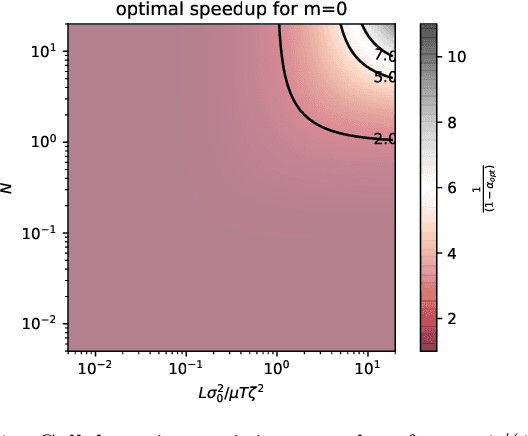
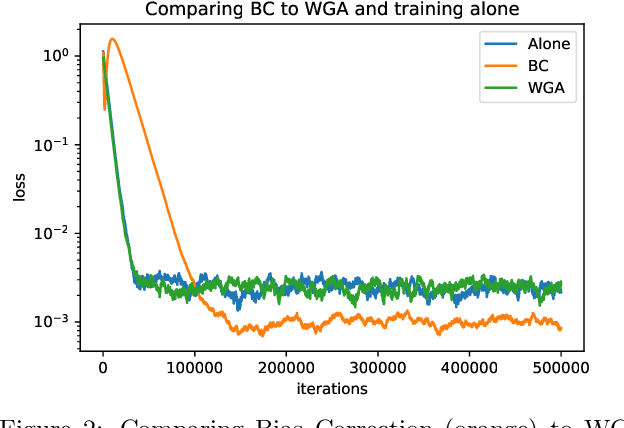
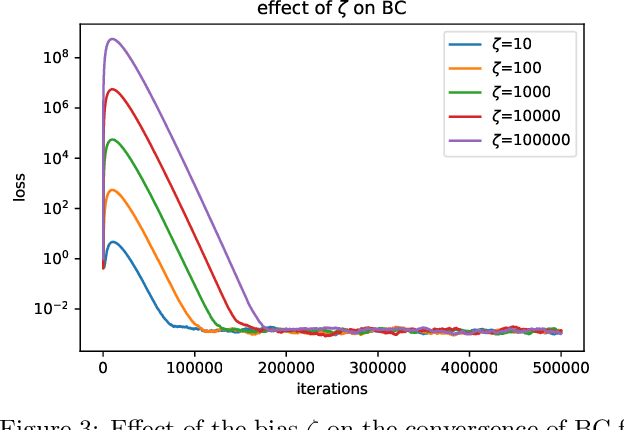
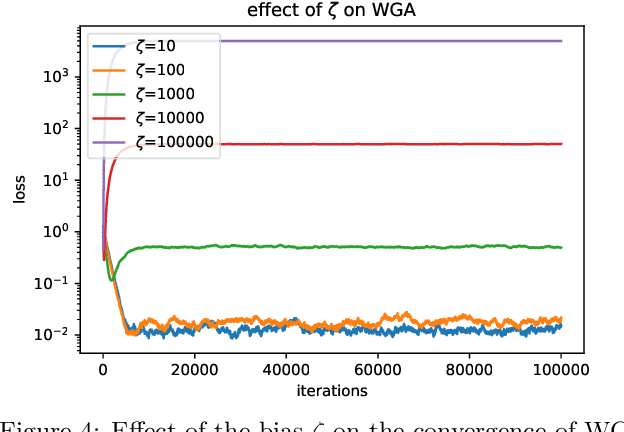
Abstract:Personalization in federated learning can improve the accuracy of a model for a user by trading off the model's bias (introduced by using data from other users who are potentially different) against its variance (due to the limited amount of data on any single user). In order to develop training algorithms that optimally balance this trade-off, it is necessary to extend our theoretical foundations. In this work, we formalize the personalized collaborative learning problem as stochastic optimization of a user's objective $f_0(x)$ while given access to $N$ related but different objectives of other users $\{f_1(x), \dots, f_N(x)\}$. We give convergence guarantees for two algorithms in this setting -- a popular personalization method known as \emph{weighted gradient averaging}, and a novel \emph{bias correction} method -- and explore conditions under which we can optimally trade-off their bias for a reduction in variance and achieve linear speedup w.r.t.\ the number of users $N$. Further, we also empirically study their performance confirming our theoretical insights.
Towards Model Agnostic Federated Learning Using Knowledge Distillation
Oct 28, 2021

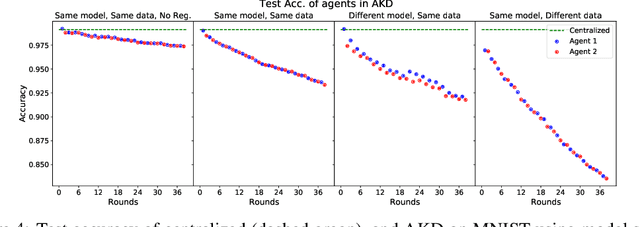
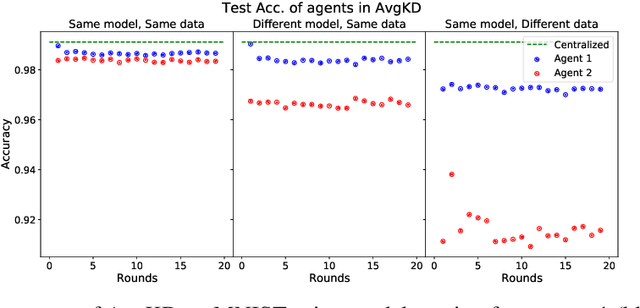
Abstract:An often unquestioned assumption underlying most current federated learning algorithms is that all the participants use identical model architectures. In this work, we initiate a theoretical study of model agnostic communication protocols which would allow data holders (agents) using different models to collaborate with each other and perform federated learning. We focus on the setting where the two agents are attempting to perform kernel regression using different kernels (and hence have different models). Our study yields a surprising result -- the most natural algorithm of using alternating knowledge distillation (AKD) imposes overly strong regularization and may lead to severe under-fitting. Our theory also shows an interesting connection between AKD and the alternating projection algorithm for finding intersection of sets. Leveraging this connection, we propose a new algorithms which improve upon AKD. Our theoretical predictions also closely match real world experiments using neural networks. Thus, our work proposes a rich yet tractable framework for analyzing and developing new practical model agnostic federated learning algorithms.
RelaySum for Decentralized Deep Learning on Heterogeneous Data
Oct 08, 2021



Abstract:In decentralized machine learning, workers compute model updates on their local data. Because the workers only communicate with few neighbors without central coordination, these updates propagate progressively over the network. This paradigm enables distributed training on networks without all-to-all connectivity, helping to protect data privacy as well as to reduce the communication cost of distributed training in data centers. A key challenge, primarily in decentralized deep learning, remains the handling of differences between the workers' local data distributions. To tackle this challenge, we introduce the RelaySum mechanism for information propagation in decentralized learning. RelaySum uses spanning trees to distribute information exactly uniformly across all workers with finite delays depending on the distance between nodes. In contrast, the typical gossip averaging mechanism only distributes data uniformly asymptotically while using the same communication volume per step as RelaySum. We prove that RelaySGD, based on this mechanism, is independent of data heterogeneity and scales to many workers, enabling highly accurate decentralized deep learning on heterogeneous data. Our code is available at http://github.com/epfml/relaysgd.
A Field Guide to Federated Optimization
Jul 14, 2021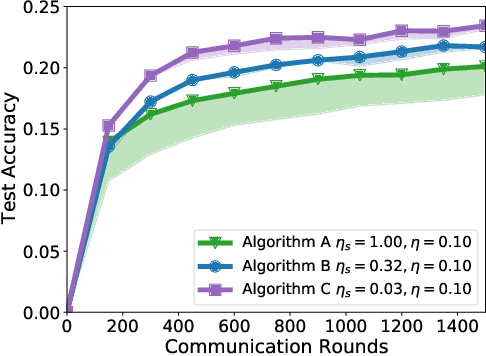



Abstract:Federated learning and analytics are a distributed approach for collaboratively learning models (or statistics) from decentralized data, motivated by and designed for privacy protection. The distributed learning process can be formulated as solving federated optimization problems, which emphasize communication efficiency, data heterogeneity, compatibility with privacy and system requirements, and other constraints that are not primary considerations in other problem settings. This paper provides recommendations and guidelines on formulating, designing, evaluating and analyzing federated optimization algorithms through concrete examples and practical implementation, with a focus on conducting effective simulations to infer real-world performance. The goal of this work is not to survey the current literature, but to inspire researchers and practitioners to design federated learning algorithms that can be used in various practical applications.
Quasi-Global Momentum: Accelerating Decentralized Deep Learning on Heterogeneous Data
Feb 09, 2021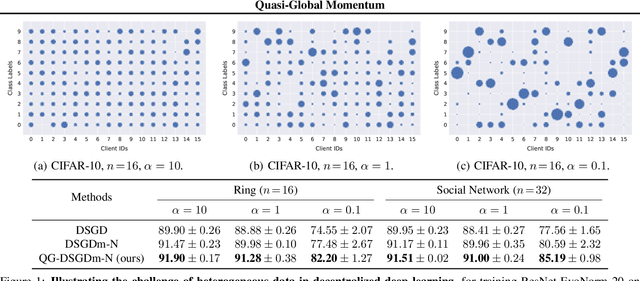
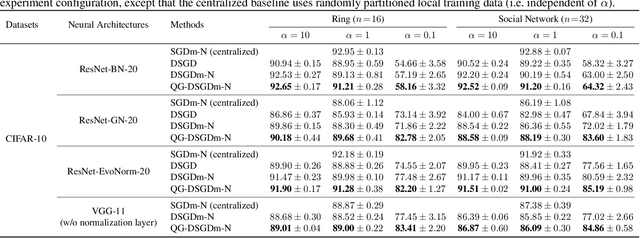
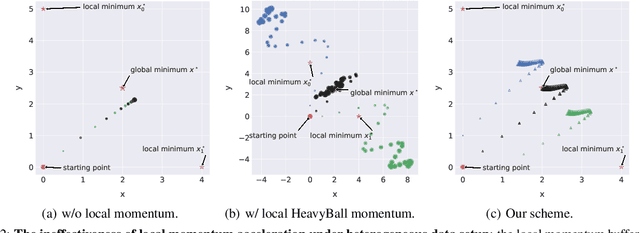
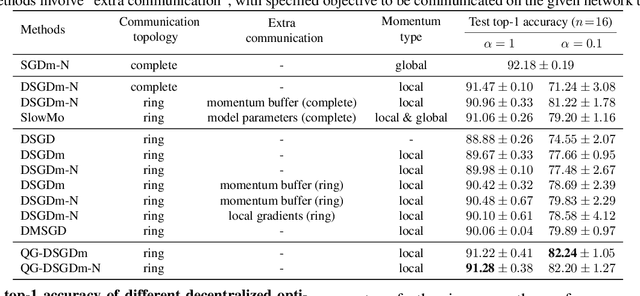
Abstract:Decentralized training of deep learning models is a key element for enabling data privacy and on-device learning over networks. In realistic learning scenarios, the presence of heterogeneity across different clients' local datasets poses an optimization challenge and may severely deteriorate the generalization performance. In this paper, we investigate and identify the limitation of several decentralized optimization algorithms for different degrees of data heterogeneity. We propose a novel momentum-based method to mitigate this decentralized training difficulty. We show in extensive empirical experiments on various CV/NLP datasets (CIFAR-10, ImageNet, AG News, and SST2) and several network topologies (Ring and Social Network) that our method is much more robust to the heterogeneity of clients' data than other existing methods, by a significant improvement in test performance ($1\% \!-\! 20\%$).
Learning from History for Byzantine Robust Optimization
Dec 18, 2020
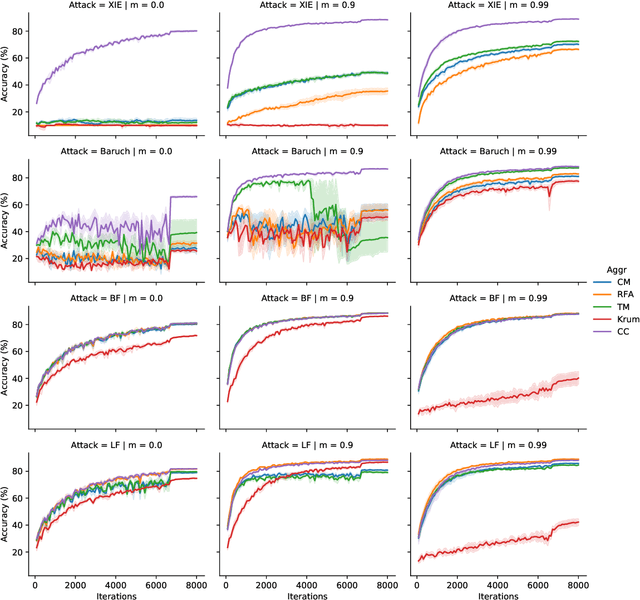

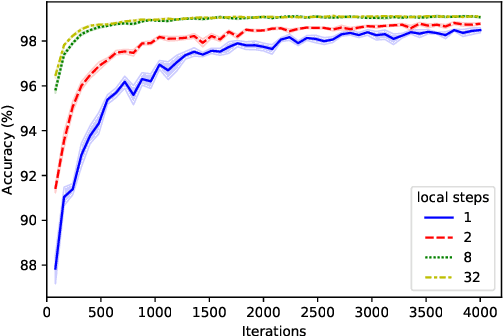
Abstract:Byzantine robustness has received significant attention recently given its importance for distributed and federated learning. In spite of this, we identify severe flaws in existing algorithms even when the data across the participants is assumed to be identical. First, we show that most existing robust aggregation rules may not converge even in the absence of any Byzantine attackers, because they are overly sensitive to the distribution of the noise in the stochastic gradients. Secondly, we show that even if the aggregation rules may succeed in limiting the influence of the attackers in a single round, the attackers can couple their attacks across time eventually leading to divergence. To address these issues, we present two surprisingly simple strategies: a new iterative clipping procedure, and incorporating worker momentum to overcome time-coupled attacks. This is the first provably robust method for the standard stochastic non-convex optimization setting.
Mime: Mimicking Centralized Stochastic Algorithms in Federated Learning
Aug 08, 2020
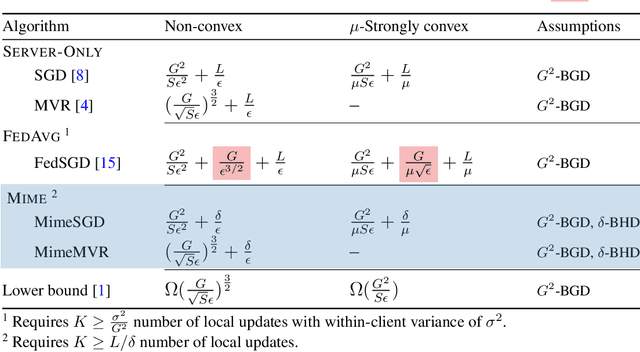
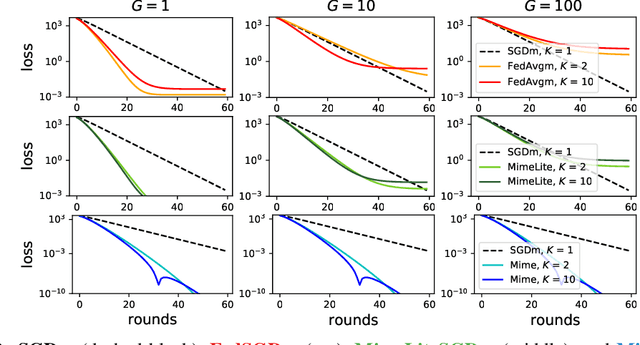

Abstract:Federated learning is a challenging optimization problem due to the heterogeneity of the data across different clients. Such heterogeneity has been observed to induce client drift and significantly degrade the performance of algorithms designed for this setting. In contrast, centralized learning with centrally collected data does not experience such drift, and has seen great empirical and theoretical progress with innovations such as momentum, adaptivity, etc. In this work, we propose a general framework Mime which mitigates client-drift and adapts arbitrary centralized optimization algorithms (e.g.\ SGD, Adam, etc.) to federated learning. Mime uses a combination of control-variates and server-level statistics (e.g. momentum) at every client-update step to ensure that each local update mimics that of the centralized method. Our thorough theoretical and empirical analyses strongly establish Mime's superiority over other baselines.
PowerGossip: Practical Low-Rank Communication Compression in Decentralized Deep Learning
Aug 04, 2020Abstract:Lossy gradient compression has become a practical tool to overcome the communication bottleneck in centrally coordinated distributed training of machine learning models. However, algorithms for decentralized training with compressed communication over arbitrary connected networks have been more complicated, requiring additional memory and hyperparameters. We introduce a simple algorithm that directly compresses the model differences between neighboring workers using low-rank linear compressors applied on model differences. Inspired by the PowerSGD algorithm for centralized deep learning, this algorithm uses power iteration steps to maximize the information transferred per bit. We prove that our method requires no additional hyperparameters, converges faster than prior methods, and is asymptotically independent of both the network and the compression. Out of the box, these compressors perform on par with state-of-the-art tuned compression algorithms in a series of deep learning benchmarks.
Byzantine-Robust Learning on Heterogeneous Datasets via Resampling
Jun 23, 2020

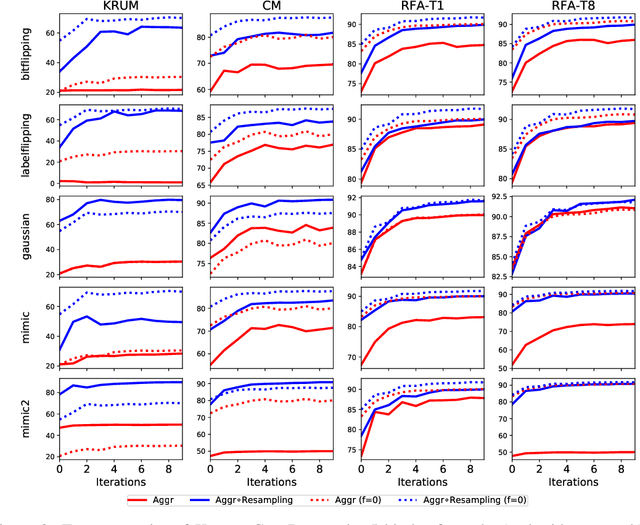
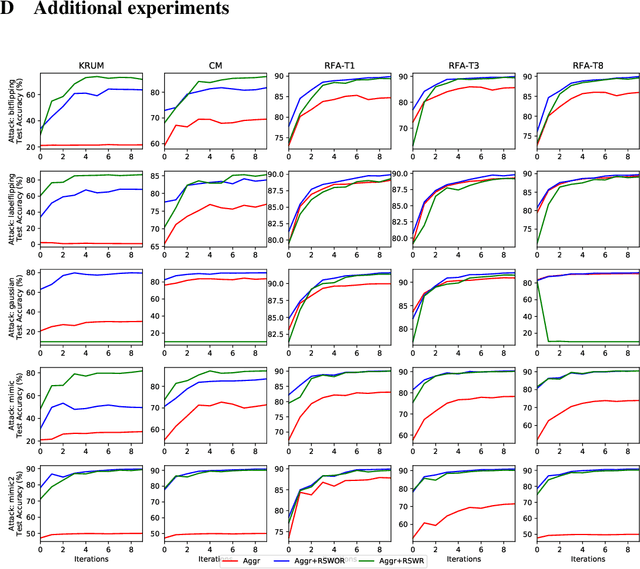
Abstract:In Byzantine robust distributed optimization, a central server wants to train a machine learning model over data distributed across multiple workers. However, a fraction of these workers may deviate from the prescribed algorithm and send arbitrary messages to the server. While this problem has received significant attention recently, most current defenses assume that the workers have identical data. For realistic cases when the data across workers is heterogeneous (non-iid), we design new attacks which circumvent these defenses leading to significant loss of performance. We then propose a simple resampling scheme that adapts existing robust algorithms to heterogeneous datasets at a negligible computational cost. We theoretically and experimentally validate our approach, showing that combining resampling with existing robust algorithms is effective against challenging attacks.
 Add to Chrome
Add to Chrome Add to Firefox
Add to Firefox Add to Edge
Add to Edge